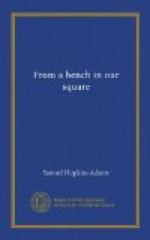“One mule blows through one hospital, one through another. Everything near is covered with mud. The great lady is thrown to the floor, but she is not hurt. She rises and attends the injured and calms the terrified. The hospitals are saved. It is a glorious thing to have driven a dump-cart for one’s country—so.”
“But what became of our Plooie?” besought the Bonnie Lassie.
The big man spread his arms in a wide, Gallic gesture. “They looked for him everywhere. No sign. But by and by some one saw a quite large piece of mud on the hospital roof begin to wriggle. The little Garin was that large piece of mud. They brought him down and put him in the hospital which he had saved. For a long time he had shell-shock. Even now he cannot speak of the war without his nerves being affected. When he got out of hospital, he did not seem to know who he was. Or perhaps he did not care. Shell-shock is a strange thing. He went away, and his records were lost in the general confusion. Afterward we sought for him. The great lady wished very much to see him. But we could find nothing except that he had come back to this country. Official inquiry was made here and he was traced to Our Square. So I came to see him. Because he cannot speak for himself and will not allow his wife to tell his story—it is part of the shell-shock which will wear off in time—I came to speak for him.”
“Does your—do you do this sort of thing often?” asked the Bonnie Lassie with a queer sort of resonance in her voice.
The big man answered, in a tone which suggested that he was smiling: “One cannot visit all the brave men who suffered for Belgium. But there is a special reason here, the matter of the great and greatly loved lady whom the little Garin saved.”
“I see,” said the Bonnie Lassie softly.
After the big man had made his adieux, we sat silent for some minutes. Presently she spoke; there was wonder and something else in her voice.
“Plooie!” she said, and that was all.
“You are crying,” I said.
“I’m not,” she retorted indignantly. “But you ought to be. For your injustice.”
“If we all bewept our injustices,” said I oracularly, “Noah would have to come back and build a new ark for a bigger flood than his.”
“What do you think of him?” said the Bonnie Lassie.
“As a weather-prophet, he was unequaled. As an expert animal-breeder, his selections were at times ill-advised.”
“Don’t be tiresome, Dominie. You know that I’m not interested in Noah.”
“As to our romantic visitant,” I said, “I think that Cyrus the Gaunt would better be watchful. I’ve never known anyone else except Cyrus to produce such an emotional effect upon you.”
“Don’t be school-girlish!” admonished the Bonnie Lassie severely. “Poor old Dominie! He doesn’t know what’s going on under his very nose. Where are your eyes?”




